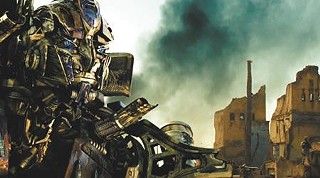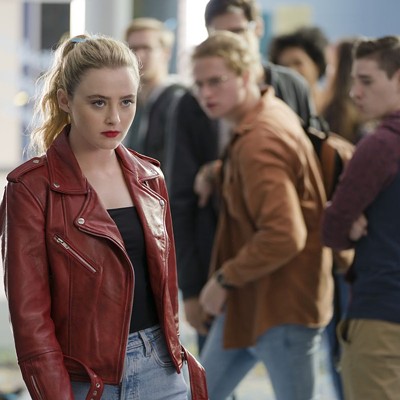Transformers: Revenge of the Fallen
*
To both my horror and delight -- horror because of my general disdain for the Michael Bay oeuvre, delight because of my desire to enjoy every picture I see (contrary to popular belief, film critics don't enter a theater wanting to hate the movie; what sort of dreary, masochistic career would that make?) -- I somewhat dug 2007's Transformers, writing in my original review that "even folks who wouldn't know a Transformer from a Teletubby can expect to have a good time" and praising the film for being "decidedly more character-driven than expected" and "balancing action with emotion." For this, I credited the presence of executive producer Steven Spielberg, who was described in the press notes as being a "hands-on producer" during the making of a film that, in its best moments, recalled the mirth of Spielberg's own 1980s output. Well, Spielberg must have been on an extended vacation and far away from the set during the making of Transformers: Revenge of the Fallen, a perfectly dreadful sequel that's the filmic equivalent of a 150-minute waterboarding session. As before, two warring factions of intergalactic robots -- the noble Autobots and the evil Decepticons -- are waging their battle on our planet, with youngsters Sam Witwicky (Shia LaBeouf) and Mikaela Banes (Megan Fox) offering their support to the good 'bots. Yet while the film's running time is almost identical to that of its predecessor, the priorities for this torturous follow-up have been shifted. The slugfests between the Autobots and the Decepticons -- incidentally, the dullest portions of the first flick -- have been elongated this time around, and without the added benefit of allowing viewers (except for the most devoted fanboys, of course) to figure out who the hell is pummeling who. And by including more fights and more explosions and more military hardware (Bay must fantasize about fondling missiles the way teenage boys fantasize about fondling Fox), that leaves less room for any meaningful human interaction. On the other hand, given that scripters Ehren Kruger, R oberto Orci and Alex Kurtzman have made Sam's parents (Kevin Dunn and Julie White) more insufferable than before and also have added an annoying new character (Ramon Rodriguez as Sam's dorkish, dickish college roommate), maybe the less seen of the humans, the better. Unfortunately, the Transformers themselves are no more interesting. Several new ones have been introduced, with the most offensive being two "black" Transformers who sport buck teeth (one gold), admit to not being able to read, and cuss a lot. Forget Jar Jar Binks, who comes across like Paul Robeson when compared to these stooges: You'd have to go back to the days of Stepin Fetchit and Sleep 'n' Eat (nee Willie Best) to find such a jolting comparison. Bay doesn't believe in stooping too low, so he also treats us to not one but two shots of dogs screwing, as well as a mini-Transformer humping Mikaela's leg, a Transformer with flatulence problems and a close-up of John Turturro's thong-clad buttocks. And did I mention the swinging metallic testicles on one of the Decepticons? That last-named bit of idiocy thus allows me to segue into my own phallic quip: This movie sucks.
Away We Go
**1/2
One of the best films of 2008, director Sam Mendes' Revolutionary Road offered a powerful and penetrating study of a bickering couple trapped by the conformity they felt defined -- and controlled -- their lives. Mendes' latest picture takes a different tack, examining a loving pair who forge their own path in an attempt to find their place in the world. It's a nice about-face for the director, even if the results prove to be wildly uneven. Working from a script by Dave Eggers and Vendela Vida, Mendes focuses on Burt (John Krasinski) and his pregnant girlfriend Verona (Maya Rudolph), who visit friends and family members in various parts of the country (plus Canada) in an attempt to figure out the best place to raise their child. Initially, they're mainly forced to contend with folks who behave outrageously -- Burt's parents (Catherine O'Hara and Jeff Daniels) and Maya's former boss (Allison Janney) among them -- but calmer visits to old college chums (Chris Messina and Melanie Lynskey) and Burt's brother (Paul Schneider) allow them to take stock of their situation in a more clearheaded manner. Similar in tone (if not degree of success) to Zach Braff's Garden State, Away We Go is an introspective piece about young people wrestling with the notion of what truly constitutes the cherished notions of "home" and "family." Yet even indelible comic turns by Janney and Maggie Gyllenhaal (as a New Age weirdo who believes it's important for children to watch their parents having sex) can't completely subjugate the smugness and self-importance that alternately raise their heads through the first half of the film. The second part is more affecting, though it similarly suffers from an episodic structure that curtails some segments before they reach their full potential. Perhaps a tighter focus would have prevented this curious road flick from veering all over the map.
My Sister's Keeper
***
Making a weepie for mass audiences can't be that hard: Just place a person in a tragic situation and steer clear of the resultant flood. But making a weepie that doesn't feel manipulative, exploitive or sloppily sentimental is another matter altogether. With My Sister's Keeper, an adaptation of Jodi Picoult's novel, director-cowriter Nick Cassavetes largely succeeds in respecting both his subject matter and his audience. As with previous films (including The Notebook), Cassavetes shows that he has trouble properly pacing a mainstream effort -- a direct result, perhaps, of being the son of indie icon John Cassavetes, who always marched to his own idiosyncratic beat. But this submergence of Hollywood know-how also allows this latest work to speak plainly, relating the story of a young girl, Anna Fitzgerald (Abigail Breslin), whose parents (Cameron Diaz and Jason Patric) created her specifically so they would have "spare parts" (bone marrow, kidney, etc.) to help prolong the life of their cancer-stricken daughter Kate (Sofia Vassilieva). Anna finally objects to second-class status and sues her parents for "medical emancipation." Alec Baldwin is a lot of fun as Anna's sympathetic lawyer, and we wish there were more of him; at the same time, the fact that Cassavetes and co-scripter Jeremy Leven limit his screen time demonstrates their determination to fastidiously avoid any crowd-pleasing but unnecessary theatrics that would detract from the sincerity of the story. Rather, much time is spent on the moral implications of the issue at hand (nobody, not even Diaz's myopic mom, is painted as a villain), and the picture never shies away from showing the physical deterioration of Kate (Vassilieva is excellent in the role). My Sister's Keeper isn't quite a keeper -- beyond Cassavetes' erratic direction, the shortchanging of some key characters hinders the product -- but it's a sturdy melodrama that earns those copious tears.
Cheri
*1/2
Michelle Pfeiffer has been excellent in all manner of movies, but in such period pieces as The Age of Innocence and Dangerous Liaisons, she has proven to be especially memorable, ably portraying passionate yet stifled women who find themselves as constricted by the mores of society as by the corsets they don under their extravagant dresses. In Cheri, the movie itself is the corset, strangling the actress and everything surrounding her until all the breath has been driven out of the material. Adapted from two works by Gigi author Colette, Cheri and The Last of Cheri, this new collaboration by the Dangerous Liaisons team of Pfeiffer, director Stephen Frears and screenwriter Christopher Hampton is a deadly dull affair about a deadly dull affair between a retired courtesan named Lea de Lonval (Pfeiffer) and Cheri (Rupert Friend), the young son of another former courtesan (Kathy Bates). The wealthy Lea takes care of her young stud for several years, but their relationship is threatened when Cheri's mother helps arrange a marriage between her son and a demure woman (Felicity Jones) closer to his own age. Friend is excruciatingly boring as the supposedly magnetic Cheri, meaning that it's a mystery why Lea would want to spend one minute with him, let alone many years. The lack of chemistry between the pair serves to weaken an already rickety enterprise, with the miscast Bates' incongruous turn (she's about as French as Captain America) providing some unexpected relief in this cinematic flatline.
The Proposal
**1/2
After the stereotypical rom-com inanities of 27 Dresses, director Anne Fletcher partially redeems herself -- as both an able filmmaker and a progressive woman -- with her latest effort, The Proposal. Working with debuting screenwriter Pete Chiarelli, she's managed to put out a picture that paints its heroine in one-dimensional strokes only part of the time.
True, The Proposal depicts protagonist Margaret Tate (Sandra Bullock) in the same manner as most Hollywood flicks (see New in Town for another recent example): Because she's a career woman, she has no time for friends, lovers, hobbies or, apparently, even a rascally Rabbit (the battery-powered kind, that is). She's a ruthless, soulless workaholic, and the only reason Andrew (Ryan Reynolds) works as her assistant at a New York publishing house is because he figures it's a good career move. But when it looks as if Margaret will get shipped back to her Canadian homeland because of an expired visa, it appears as if his future will similarly get derailed. Margaret, though, has a plan: Force Andrew to marry her so that she can remain in the country. He reluctantly agrees, and they spend a long weekend in his Alaskan hometown so she can win over his parents (Mary Steenburgen and Craig T. Nelson) and 90-year-old grandmother (Betty White). That these two will eventually fall for each other will come as a surprise to absolutely no one -- not even your own 90-year-old grandmother -- yet the predictability of the plot isn't a detriment, since the film fits as comfortably around our expectations as a favorite old robe hugs our frame. And while the picture occasionally goes out of its way to make Bullock's character a ninny, the actress refuses to let the role manhandle her, and she and the ever-charming Reynolds work well together. Furthermore, their characters' relationship is rare in that it offers an older woman-younger man hookup that's generally a nonentity in mainstream fare (Bullock's 44 while Reynolds' 32) and then goes the extra mile by never making their age difference a running, tittering gag at Margaret's expense. Unfortunately, Fletcher and Chiarelli can't help but go for the easy, imbecilic laugh at several key junctures, and the film even includes one of those cringe-worthy moments in which a person declares his devotion to his beloved in front of a crowd of people (honestly, has this ever happened in real life, or do I simply hang out in the wrong coffeehouses/offices/parks/stores?). Still, this Proposal has enough merit to warrant some consideration.
Year One
*
Biblical times were milked for raunchy but riotous laughs in Mel Brooks' History of the World: Part I and Monty Python's Life of Brian, but the well seems to have run dry when it comes to Year One, a disastrous comedy that's the cinematic equivalent of an old-fashioned flogging. Jack Black and Michael Cera, never straying more than a centimeter from their established screen personas (misguided blowhard and sarcastic wimp, respectively), star as Zed and Oh, tribal misfits banished from their village and left to wander the land. Like ancient Forrest Gumps, they run into a few historical figures -- Cain (David Cross) and Abel (Paul Rudd), Abraham (Hank Azaria) and Isaac (Christopher Mintz-Plasse) -- although they spend most of their time in the city of Sodom, with Zed laboring under the impression that he's God's Chosen One while Oh tries to keep his distance from a fey priest (Oliver Platt, in a guilty pleasure of a performance) with a penchant for having his hairy chest rubbed with oil. Even with gags involving the eating of feces and the drinking of urine (to say nothing about jokes involving vomiting, incest, bestiality, and on and on and on), Year One is far too witless to even be considered distasteful or disturbing -- it's more like watching with pity as a dorky fifth-grader tries to shock adults with a string of profanity. As if the material wasn't rancid enough, the picture appears to have been edited with a battle-ax, as continuity is frequently nonexistent in this film (what happened to the snake choking the life out of Oh?). I'd be lying, though, if I didn't admit that a couple of moments made me smile. A couple. As in two. If that's enough merriment to fill your belly, then by all means, knock yourself out.


























